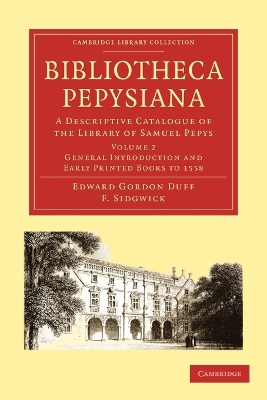Cambridge Library Collection - History of Printing, Publishing and Libraries
1 primary work • 2 total works
Volume 2
Samuel Pepys (1633–1703) was a student of Magdalene College, Cambridge, and bequeathed his personal library of 3000 volumes to the College on condition that the contents remained intact and unaltered; they remain there, in his original bookcases, to this day. In the early twentieth century, a project to produce a complete catalogue was begun, and four volumes were published between 1914 and 1940. Volume 2 contains a general introduction to the library and its history, including extracts from Pepys's diary, will, and accounts. It then lists and describes the early printed books, with notes as to special features, other extant copies and publication history, among them several liturgical books in the Sarum rite and 1557 editions of Malory's La morte d'Arthur and the works of Thomas More. It also includes an index of printers. This catalogue remains a valuable resource for researchers in early publishing history and seventeenth-century studies.
Bibliotheca Pepysiana: Volume 2, General Introduction and Early Printed Books to 1558
by Edward Gordon Duff
Published 29 August 2010
Samuel Pepys (1633-1703) was a student of Magdalene College, Cambridge, and bequeathed his personal library of 3000 volumes to the College on condition that the contents remained intact and unaltered; they remain there, in his original bookcases, to this day. In the early twentieth century, a project to produce a complete catalogue was begun, and four volumes were published between 1914 and 1940. Volume 2 contains a general introduction to the library and its history, including extracts from Pepys's diary, will, and accounts. It then lists and describes the early printed books, with notes as to special features, other extant copies and publication history, among them several liturgical books in the Sarum rite and 1557 editions of Malory's La morte d'Arthur and the works of Thomas More. It also includes an index of printers. This catalogue remains a valuable resource for researchers in early publishing history and seventeenth-century studies.

